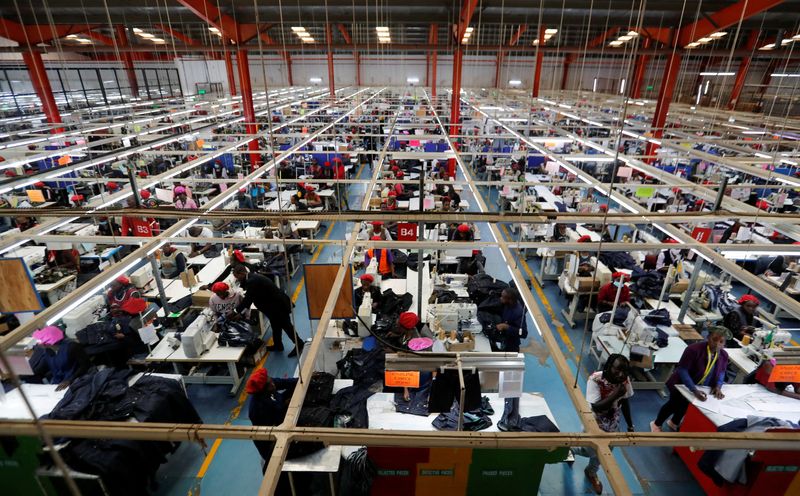Africa-US trade programme needs at least 10-year extension, AU says
2023.11.02 09:44
2/2

© Reuters. FILE PHOTO: Kenyan workers prepare clothes for export at the United Aryan Export Processing Zone (EPZ) factory, operating under the U.S. African Growth and Opportunity Act (AGOA), in Ruaraka district of Nairobi, Kenya October 26, 2023. REUTERS/Thomas Muko
2/2
By Joe Bavier
JOHANNESBURG (Reuters) – Africa wants the U.S. Congress to renew its flagship trade programme for the continent for at least 10 years, the African Union’s top trade official said on Thursday, adding that any modifications to the initiative should only be considered later.
Speaking at the start of three days of meetings of African trade ministers and U.S. officials, AU Trade Commissioner Albert Muchanga also said the United States will not be granted tariff free access to a new African free trade area.
First launched in 2000, the African Growth and Opportunity Act (AGOA) grants exports from qualifying African countries duty free access to the United States – the world’s largest consumer market. It is due to expire in September 2025, and discussions are currently under way for its possible renewal.
“(An extension of) 10 to 20 years is very critical to the investment community. Anything lower than that would generate uncertainty,” Muchanga told the ministers, who gathered in Johannesburg to form a common position on the future of the programme.
The African ministers are due to meet with U.S. officials, including U.S. Trade Representative Katherine Tai, on Friday and Saturday.
U.S. lawmakers and the Biden administration have voiced support for renewing AGOA, which saw over $10 billion worth of African exports enter the United States duty free last year.
However, there is debate in Washington over whether the initiative needs updating.
Constance Hamilton, the Biden administration’s top trade official for Africa, said last week that Congress should consider changes that would “make the programme more impactful”.
African governments and some U.S. industry groups warn that attempting to modify AGOA as part of the renewal process could delay its reauthorisation.
“If there are any enhancements to be made, those should be done after the extension,” Muchanga said.
AGOA’s duty free provisions are currently one-sided. U.S. exports to African markets remain subject to national tariffs. Some U.S. lawmakers have in the past suggested the programme should be made more reciprocal.
Africa is in the process of setting up a new continent-wide free trade area, known as the AfCFTA, that aims to bring together 1.3 billion people in a $3.4 trillion economic bloc. Once fully implemented it will be the largest free trade area since the establishment of the World Trade Organization.
Muchanga told the ministers that many of the U.S. officials and lawmakers he had met to discuss AGOA’s renewal had assumed U.S. exports would be granted duty free entrance to the AfCFTA.
“I’ve told them very, very frankly that that is not possible,” he said. “If they try to export goods from the United States of America into Africa, they are going to meet national tariffs.”
The Biden administration said on Oct. 30 it intended to end the participation of Gabon, Niger, Uganda and the Central African Republic in AGOA over governance and rights failings.







